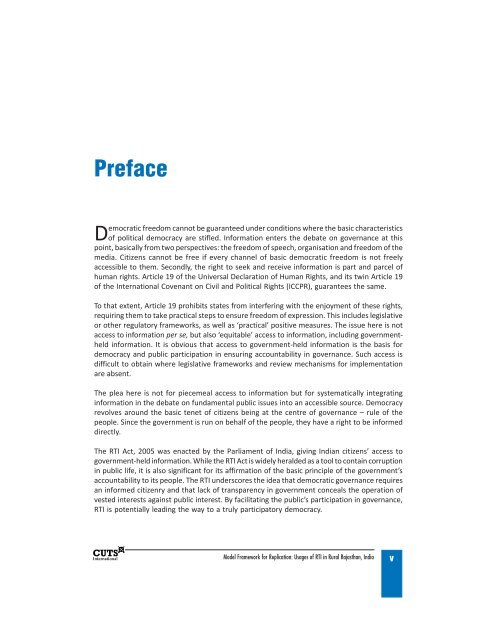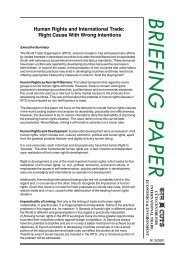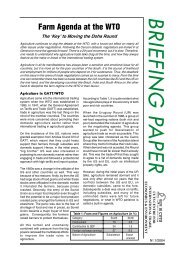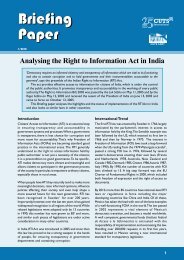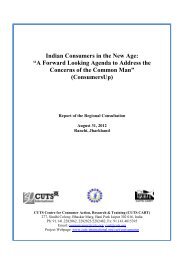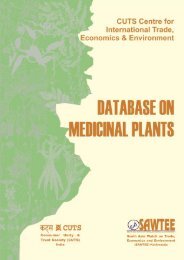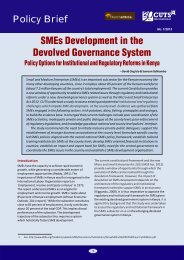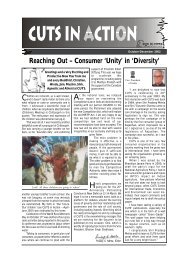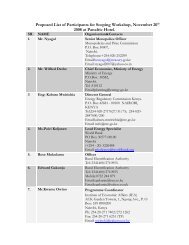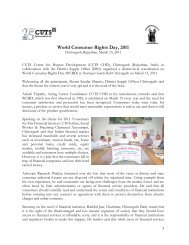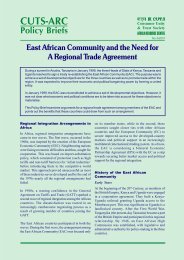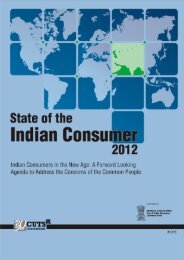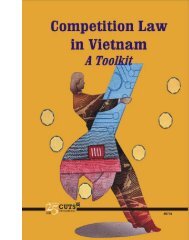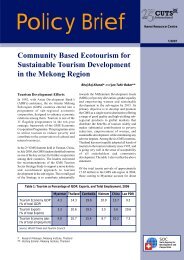Usages of RTI in Rural Rajasthan, India - Consumer Unity & Trust ...
Usages of RTI in Rural Rajasthan, India - Consumer Unity & Trust ...
Usages of RTI in Rural Rajasthan, India - Consumer Unity & Trust ...
Create successful ePaper yourself
Turn your PDF publications into a flip-book with our unique Google optimized e-Paper software.
PrefaceDemocratic freedom cannot be guaranteed under conditions where the basic characteristics<strong>of</strong> political democracy are stifled. Information enters the debate on governance at thispo<strong>in</strong>t, basically from two perspectives: the freedom <strong>of</strong> speech, organisation and freedom <strong>of</strong> themedia. Citizens cannot be free if every channel <strong>of</strong> basic democratic freedom is not freelyaccessible to them. Secondly, the right to seek and receive <strong>in</strong>formation is part and parcel <strong>of</strong>human rights. Article 19 <strong>of</strong> the Universal Declaration <strong>of</strong> Human Rights, and its tw<strong>in</strong> Article 19<strong>of</strong> the International Covenant on Civil and Political Rights (ICCPR), guarantees the same.To that extent, Article 19 prohibits states from <strong>in</strong>terfer<strong>in</strong>g with the enjoyment <strong>of</strong> these rights,requir<strong>in</strong>g them to take practical steps to ensure freedom <strong>of</strong> expression. This <strong>in</strong>cludes legislativeor other regulatory frameworks, as well as ‘practical’ positive measures. The issue here is notaccess to <strong>in</strong>formation per se, but also ‘equitable’ access to <strong>in</strong>formation, <strong>in</strong>clud<strong>in</strong>g governmentheld<strong>in</strong>formation. It is obvious that access to government-held <strong>in</strong>formation is the basis fordemocracy and public participation <strong>in</strong> ensur<strong>in</strong>g accountability <strong>in</strong> governance. Such access isdifficult to obta<strong>in</strong> where legislative frameworks and review mechanisms for implementationare absent.The plea here is not for piecemeal access to <strong>in</strong>formation but for systematically <strong>in</strong>tegrat<strong>in</strong>g<strong>in</strong>formation <strong>in</strong> the debate on fundamental public issues <strong>in</strong>to an accessible source. Democracyrevolves around the basic tenet <strong>of</strong> citizens be<strong>in</strong>g at the centre <strong>of</strong> governance – rule <strong>of</strong> thepeople. S<strong>in</strong>ce the government is run on behalf <strong>of</strong> the people, they have a right to be <strong>in</strong>formeddirectly.The <strong>RTI</strong> Act, 2005 was enacted by the Parliament <strong>of</strong> <strong>India</strong>, giv<strong>in</strong>g <strong>India</strong>n citizens’ access togovernment-held <strong>in</strong>formation. While the <strong>RTI</strong> Act is widely heralded as a tool to conta<strong>in</strong> corruption<strong>in</strong> public life, it is also significant for its affirmation <strong>of</strong> the basic pr<strong>in</strong>ciple <strong>of</strong> the government’saccountability to its people. The <strong>RTI</strong> underscores the idea that democratic governance requiresan <strong>in</strong>formed citizenry and that lack <strong>of</strong> transparency <strong>in</strong> government conceals the operation <strong>of</strong>vested <strong>in</strong>terests aga<strong>in</strong>st public <strong>in</strong>terest. By facilitat<strong>in</strong>g the public’s participation <strong>in</strong> governance,<strong>RTI</strong> is potentially lead<strong>in</strong>g the way to a truly participatory democracy.Model Framework for Replication: <strong>Usages</strong> <strong>of</strong> <strong>RTI</strong> <strong>in</strong> <strong>Rural</strong> <strong>Rajasthan</strong>, <strong>India</strong>v


